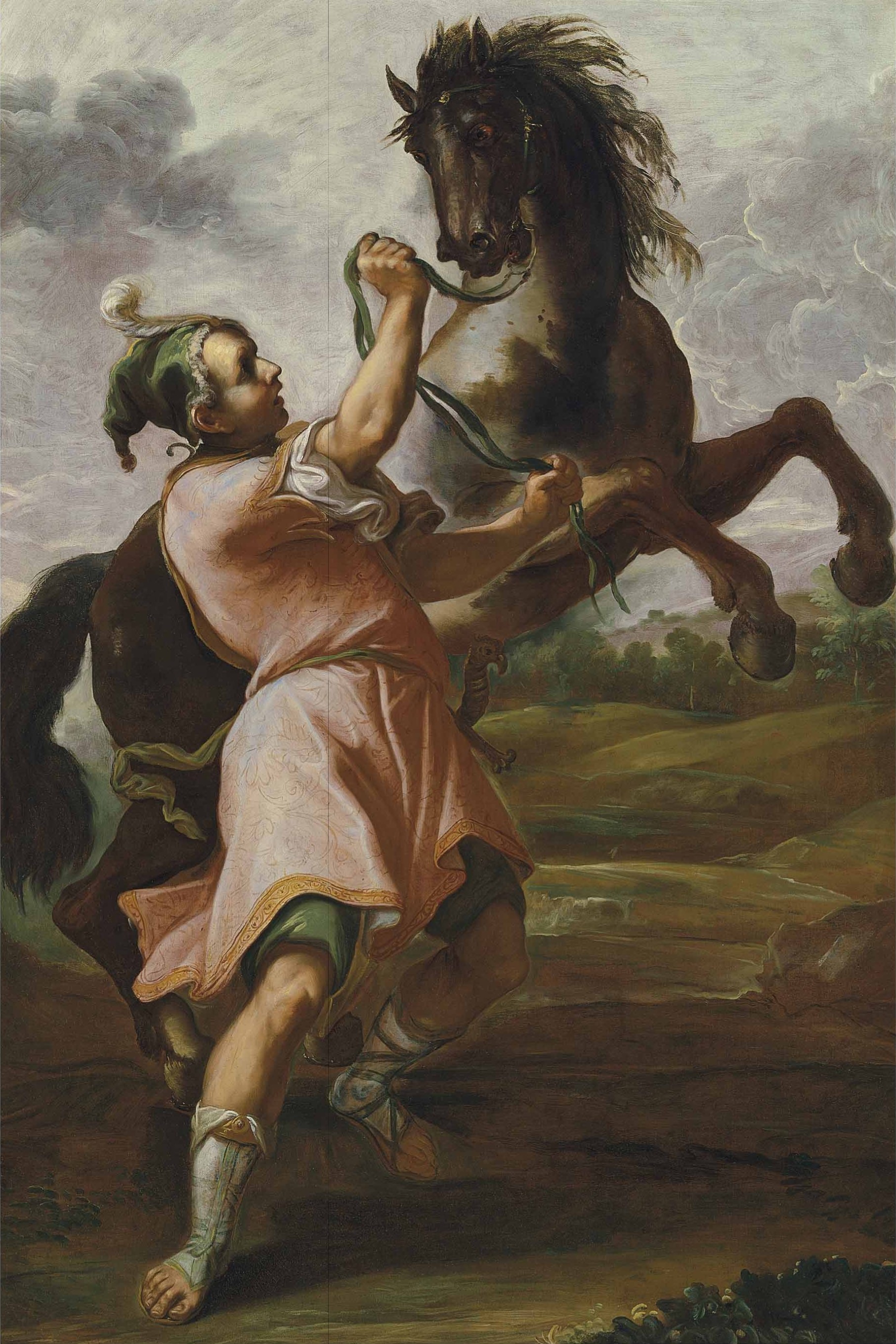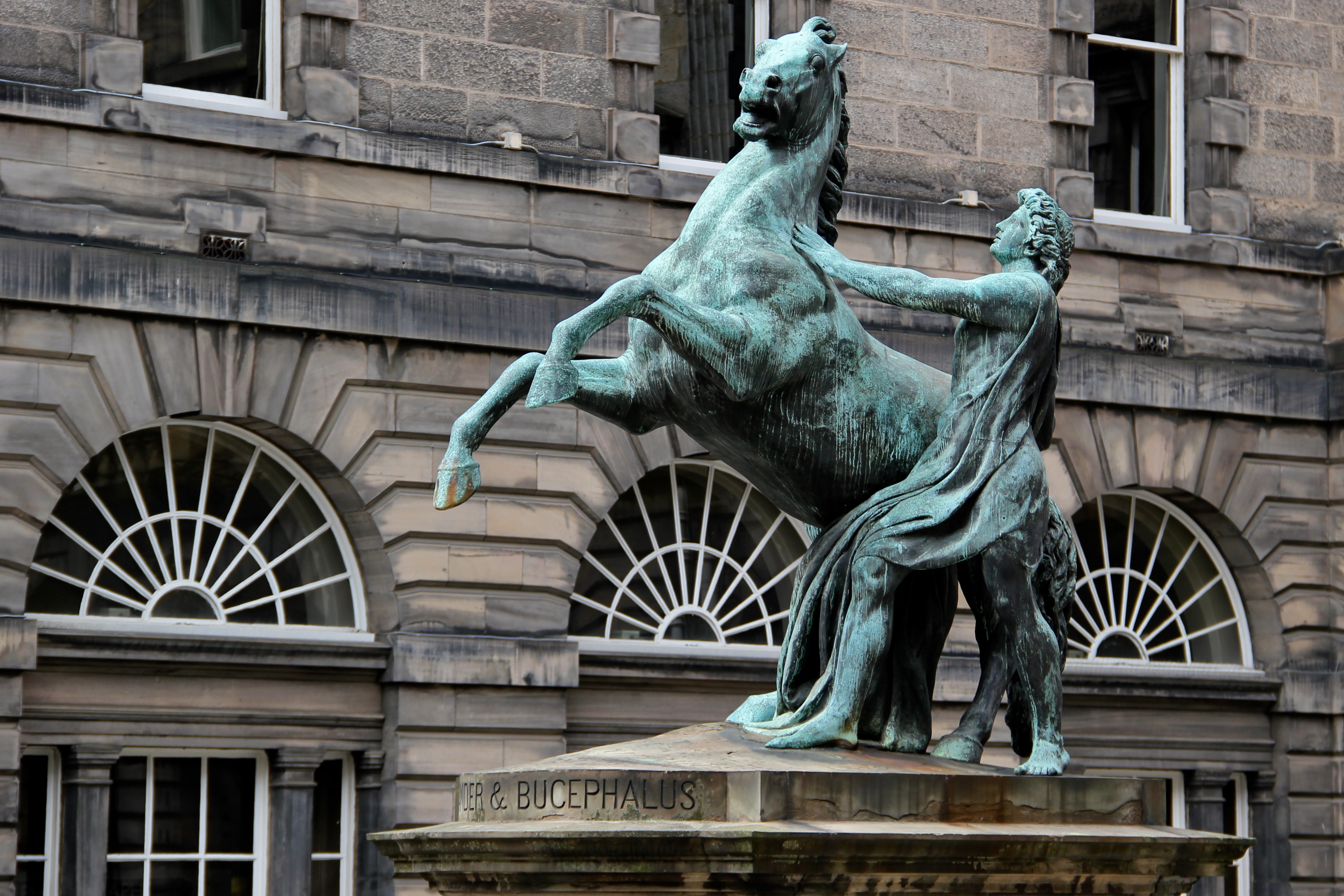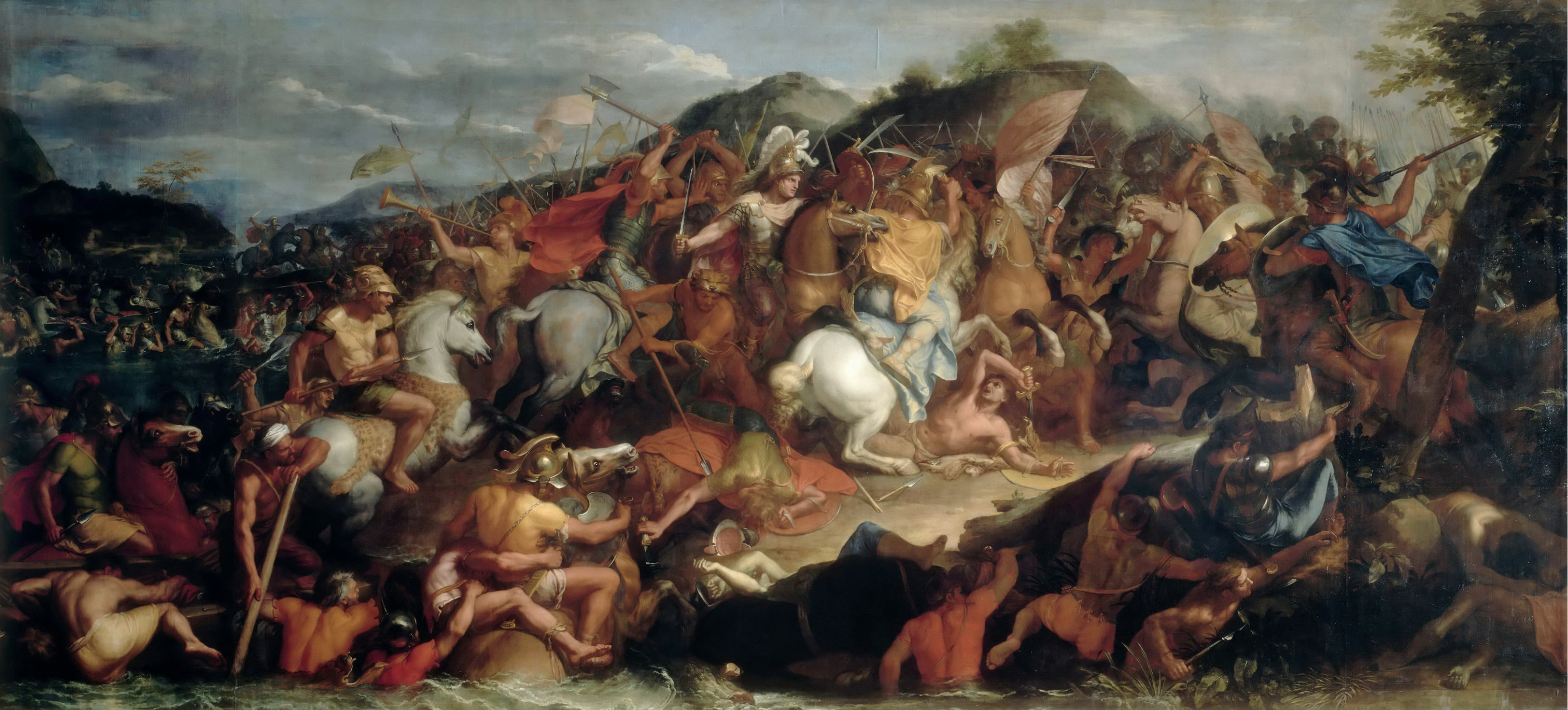Bucephalus on:
[Wikipedia]
[Google]
[Amazon]
 Bucephalus or Bucephalas (; grc, Βουκεφάλας, ; – June 326 BC) was the
Bucephalus or Bucephalas (; grc, Βουκεφάλας, ; – June 326 BC) was the
 A massive creature with a massive head, Bucephalus is described as having a black coat with a large white star on his brow. He is also supposed to have had a " wall eye" (blue eye) , and his breeding was that of the "best Thessalian strain".
A massive creature with a massive head, Bucephalus is described as having a black coat with a large white star on his brow. He is also supposed to have had a " wall eye" (blue eye) , and his breeding was that of the "best Thessalian strain".

 * The ancient
* The ancient
 Bucephalus or Bucephalas (; grc, Βουκεφάλας, ; – June 326 BC) was the
Bucephalus or Bucephalas (; grc, Βουκεφάλας, ; – June 326 BC) was the horse
The horse (''Equus ferus caballus'') is a domesticated, one-toed, hoofed mammal. It belongs to the taxonomic family Equidae and is one of two extant subspecies of ''Equus ferus''. The horse has evolved over the past 45 to 55 million yea ...
of Alexander the Great
Alexander III of Macedon ( grc, Ἀλέξανδρος, Alexandros; 20/21 July 356 BC – 10/11 June 323 BC), commonly known as Alexander the Great, was a king of the ancient Greek kingdom of Macedon. He succeeded his father Philip II to ...
, and one of the most famous horses of classical antiquity
Classical antiquity (also the classical era, classical period or classical age) is the period of cultural history between the 8th century BC and the 5th century AD centred on the Mediterranean Sea, comprising the interlocking civilizations of ...
.
Ancient historical accounts state that Bucephalus' breed was that of the "best Thessalian strain", and that he died in what is now Punjab
Punjab (; Punjabi Language, Punjabi: پنجاب ; ਪੰਜਾਬ ; ; also Romanization, romanised as ''Panjāb'' or ''Panj-Āb'') is a geopolitical, cultural, and historical region in South Asia, specifically in the northern part of the I ...
, Pakistan
Pakistan ( ur, ), officially the Islamic Republic of Pakistan ( ur, , label=none), is a country in South Asia. It is the world's List of countries and dependencies by population, fifth-most populous country, with a population of almost 24 ...
, after the Battle of the Hydaspes in 326 BC. The horse was reportedly buried at Jalalpur Sharif, a small town situated a short distance to the southwest of Jhelum
Jhelum (Punjabi and ur, ) is a city on the east bank of the Jhelum River, which is located in the district of Jhelum in the north of Punjab province, Pakistan. It is the 44th largest city of Pakistan by population. Jhelum is known for p ...
. Another account states that Bucephalus is buried in Phalia, a town located near the city of Mandi Bahauddin, which was named after him ( Alexandria Bucephalous).
Bucephalus was named after a branding mark depicting an ox's head on his haunch.
Taming of Bucephalus
Plutarch
Plutarch (; grc-gre, Πλούταρχος, ''Ploútarchos''; ; – after AD 119) was a Greek Middle Platonist philosopher, historian, biographer, essayist, and priest at the Temple of Apollo in Delphi. He is known primarily for hi ...
says in 344 BC, at twelve or thirteen years of age, Alexander of Macedonia won the horse by making a wager with his father:Arthur Hugh Clough
Arthur Hugh Clough ( ; 1 January 181913 November 1861) was an English poet, an educationalist, and the devoted assistant to Florence Nightingale. He was the brother of suffragist Anne Clough and father of Blanche Athena Clough who both became ...
(editor), John Dryden
''
John Dryden (; – ) was an English poet, literary critic, translator, and playwright who in 1668 was appointed England's first Poet Laureate.
He is seen as dominating the literary life of Restoration England to such a point that the p ...
(translator), ''Plutarch's 'Lives, vol. II, Modern Library
The Modern Library is an American book publishing imprint and formerly the parent company of Random House. Founded in 1917 by Albert Boni and Horace Liveright as an imprint of their publishing company Boni & Liveright, Modern Library became an ...
, 2001
The September 11 attacks against the United States by Al-Qaeda, which killed 2,977 people and instigated the global war on terror, were a defining event of 2001. The United States led a multi-national coalition in an invasion of Afghanist ...
. A horse dealer named Philonicus the Thessalian offered Bucephalus to King Philip II for the remarkably high sum of 13 talents. Because no one could tame the animal, Philip was not interested. However, Alexander was, and he offered to pay himself should he fail.
Alexander was given a chance and surprised all by subduing it. He spoke soothingly to the horse and turned it toward the sun so that it could no longer see its own shadow, which had been the cause of its distress. Dropping his fluttering cloak
A cloak is a type of loose garment worn over clothing, mostly but not always as outerwear for outdoor wear, serving the same purpose as an overcoat, protecting the wearer from the weather. It may form part of a uniform. Cloaks have been and ...
as well, Alexander successfully tamed the horse. Plutarch says that the incident so impressed Philip that he told the boy, "O my son, look thee out a kingdom equal to and worthy of thyself, for Macedonia is too little for thee." Philip's speech strikes the only false note in the anecdote, according to A. R. Anderson, who noted his words as the embryo of the legend fully developed in the ''History of Alexander the Great'' I.15, 17.
The '' Alexander Romance'' presents a mythic variant of Bucephalus's origin. In this tale, the colt, whose heroic attributes surpassed even those of Pegasus
Pegasus ( grc-gre, Πήγασος, Pḗgasos; la, Pegasus, Pegasos) is one of the best known creatures in Greek mythology. He is a winged divine stallion usually depicted as pure white in color. He was sired by Poseidon, in his role as hor ...
, is bred and presented to Philip on his own estates. The mythic attributes of the animal are further reinforced in the romance by the Delphic Oracle
Pythia (; grc, Πυθία ) was the name of the high priestess of the Temple of Apollo at Delphi. She specifically served as its oracle and was known as the Oracle of Delphi. Her title was also historically glossed in English as the Pythone ...
who tells Philip that the destined king of the world will be the one who rides Bucephalus, a horse with the mark of the ox's head on his haunch.
Alexander and Bucephalus
As one of his chargers, Bucephalus served Alexander in numerous battles. The value which Alexander placed on Bucephalus emulated his hero and supposed ancestorAchilles
In Greek mythology, Achilles ( ) or Achilleus ( grc-gre, Ἀχιλλεύς) was a hero of the Trojan War, the greatest of all the Greek warriors, and the central character of Homer's '' Iliad''. He was the son of the Nereid Thetis and Pe ...
, who claimed that his horses were "known to excel all others—for they are immortal. Poseidon
Poseidon (; grc-gre, Ποσειδῶν) was one of the Twelve Olympians in ancient Greek religion and myth, god of the sea, storms, earthquakes and horses.Burkert 1985pp. 136–139 In pre-Olympian Bronze Age Greece, he was venerated as ...
gave them to my father Peleus
In Greek mythology, Peleus (; Ancient Greek: Πηλεύς ''Pēleus'') was a hero, king of Phthia, husband of Thetis and the father of their son Achilles. This myth was already known to the hearers of Homer in the late 8th century BC.
Bi ...
, who in his turn gave them to me."
Arrian
Arrian of Nicomedia (; Greek: ''Arrianos''; la, Lucius Flavius Arrianus; )
was a Greek historian, public servant, military commander and philosopher of the Roman period.
''The Anabasis of Alexander'' by Arrian is considered the best ...
states, with Onesicritus
Onesicritus ( el, Ὀνησίκριτος; c. 360 BC – c. 290 BC), a Greek historical writer and Cynic philosopher, who accompanied Alexander the Great on his campaigns in Asia. He claimed to have been the commander of Alexander's fleet but w ...
as his source, that Bucephalus died at the age of thirty. Other sources, however, give as the cause of death not old age or weariness, but fatal injuries at the Battle of the Hydaspes (June 326 BC), in which Alexander's army defeated King Porus
Porus or Poros ( grc, Πῶρος ; 326–321 BC) was an ancient Indian king whose territory spanned the region between the Jhelum River (Hydaspes) and Chenab River (Acesines), in the Punjab region of the Indian subcontinent. He is only men ...
. Alexander promptly founded a city, Bucephala, in honour of his horse. It lay on the west bank of the Hydaspes river (modern-day Jhelum
Jhelum (Punjabi and ur, ) is a city on the east bank of the Jhelum River, which is located in the district of Jhelum in the north of Punjab province, Pakistan. It is the 44th largest city of Pakistan by population. Jhelum is known for p ...
in Pakistan
Pakistan ( ur, ), officially the Islamic Republic of Pakistan ( ur, , label=none), is a country in South Asia. It is the world's List of countries and dependencies by population, fifth-most populous country, with a population of almost 24 ...
). The modern-day town of Jalalpur Sharif, outside Jhelum, is said to be where Bucephalus is buried.
The legend of Bucephalus grew in association with that of Alexander, beginning with the fiction that they were born simultaneously: some of the later versions of the Alexander Romance also synchronized the hour of their death. The pair forged a sort of cult in that, after them, it was all but expected of a conqueror that he have a favourite horse. Julius Caesar
Gaius Julius Caesar (; ; 12 July 100 BC – 15 March 44 BC), was a Roman general and statesman. A member of the First Triumvirate, Caesar led the Roman armies in the Gallic Wars before defeating his political rival Pompey in a civil war, an ...
had one; so too did the eccentric Roman Emperor Caligula
Gaius Julius Caesar Augustus Germanicus (31 August 12 – 24 January 41), better known by his nickname Caligula (), was the third Roman emperor, ruling from 37 until his assassination in 41. He was the son of the popular Roman general Germani ...
, who made a great fuss of his horse Incitatus
Incitātus (, meaning "swift" or "at full gallop") was the favourite horse of Roman Emperor Caligula (). According to legend, Caligula planned to make the horse a consul, although ancient sources are clear that this did not occur.
Legend
Accordi ...
, holding birthday parties for him, riding him while adorned with Alexander's breastplate, and planning to make him a consul
Consul (abbrev. ''cos.''; Latin plural ''consules'') was the title of one of the two chief magistrates of the Roman Republic, and subsequently also an important title under the Roman Empire. The title was used in other European city-states throu ...
.
In art and literature

 * The ancient
* The ancient statue
A statue is a free-standing sculpture in which the realistic, full-length figures of persons or animals are carved or cast in a durable material such as wood, metal or stone. Typical statues are life-sized or close to life-size; a sculpture t ...
group '' The Horse Tamers'' in the Piazza del Quirinale in Rome
, established_title = Founded
, established_date = 753 BC
, founder = King Romulus ( legendary)
, image_map = Map of comune of Rome (metropolitan city of Capital Rome, region Lazio, Italy).svg
, map_caption ...
is often misinterpreted as "Alexander and Bucephalus". An interpretation of their subject as Alexander
Alexander is a male given name. The most prominent bearer of the name is Alexander the Great, the king of the Ancient Greek kingdom of Macedonia who created one of the largest empires in ancient history.
Variants listed here are Aleksandar, Al ...
and Bucephalus was proposed in 1558 by Onofrio Panvinio,''Reipublicae Romanae Commentariorum'' (Venice, 1558), noted by Haskell and Penny, 1981. who suggested that Constantine had removed them from Alexandria, where they would have referred to the familiar legend of the city's founder. This became a popular alternative to their identification as the Dioscuri
Castor; grc, Κάστωρ, Kástōr, beaver. and Pollux. (or Polydeukes). are twin half-brothers in Greek and Roman mythology, known together as the Dioscuri.; grc, Διόσκουροι, Dióskouroi, sons of Zeus, links=no, from ''Dîos'' ( ...
. The popular guides still referred to their creation by Phidias and Praxiteles competing for fame, long after even the modestly learned realized that the two sculptors preceded Alexander by a century.
* Charles Le Brun's (1619–1690) paintings of Alexandrine subjects, including Bucephalus, survive today in the Louvre
The Louvre ( ), or the Louvre Museum ( ), is the world's most-visited museum, and an historic landmark in Paris, France. It is the home of some of the best-known works of art, including the ''Mona Lisa'' and the '' Venus de Milo''. A central ...
. One in particular, ''The Passage of the Granicus'', depicts the warhorse battling the difficulties of the steep muddy river banks, biting and kicking his foes.
* Franz Kafka
Franz Kafka (3 July 1883 – 3 June 1924) was a German-speaking Bohemian novelist and short-story writer, widely regarded as one of the major figures of 20th-century literature. His work fuses elements of realism and the fantastic. It typ ...
's short story ''Der neue Advokat'' (in his collection '' Ein Landarzt'', 1919) features Bucephalus transformed.
* The 1979 film ''The Black Stallion
The Black Stallion, known as the Black or Shêtân, is the title character from author Walter Farley's bestselling series about the Arab stallion and his young owner, Alec Ramsay. The series chronicles the story of a Sheikh's prized stallion a ...
'' had the protagonist learning the story of Bucephalus from his father, which is put into practice at a later point in the film.
* In the animated series '' Reign: The Conqueror'', a sci-fi inspired rendition of the myth, Bucephalus is a tall man-eating horse with a metallic jaw, prowling in Macedonia and killing everyone unfortunate enough to meet him. Alexander tames him, and as in the myth he becomes his faithful steed.
* In the BBC television series '' Father Brown'', the bicycle that the character Father Brown rides in pursuits of solving mysteries is called Bucephalus.
* In ITV's ''Inspector Morse'' prequel drama series, '' Endeavour'', Series 6 Episode 3, Confection, the horse is also named Bucephalus.
See also
* Bucephalus (brand), an ox-head branding mark anciently used on horses *Bucephalus (racehorse)
Bucephalus (foaled 1764) was a British Thoroughbred racehorse. He won the Subscription Purse at York in 1768, but is best known for racing against the undefeated Eclipse in a match race in 1770.
Background
Bucephalus was a chestnut colt f ...
, an 18th-century Thoroughbred racehorse
* ''Bucephalus'' (trematode), a trematode flatworm genus
* BTR-4
The BTR-4 "Bucephalus" (, abbreviation of uk, Бронетранспортер, links=no, lit=armoured transporter, translit=Bronetransporter, label=none) is an amphibious 8x8 wheeled Infantry fighting vehicle (IFV) designed in Ukraine by t ...
"Bucephalus", Ukrainian armored troop carrier
Notes
References
External links
* {{Authority control Ancient individual animals Alexander the Great Alexander the Great in legend Ancient Greece History of Pakistan Individual warhorses Individual male horses